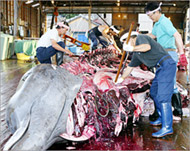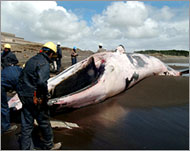Japan pushes whaling agenda
Japanese officials have expressed confidence that other countries will come round to Tokyo’s concept of whaling ahead of a crucial annual meeting of the International Whaling Commission’s Scientific Committee in Ulsan, South Korea.

The run-up to the Ulsan meeting, scheduled for 20 June, has been marked by increasingly acrimonious debate between Japan and governments that oppose whaling, particularly New Zealand and Australia.
Australian Environment Minister Ian Campbell has been amongst the most vociferous opponents of Japan‘s plans to more than double its Antarctic catch of minke whales to 945, as well as take 50 humpback and 50 fin whales.
Japan claims it needs to harpoon the whales and dissect them to determine emigration patterns as well as data on their feeding and breeding habits. It insists that subsequently serving the whale meat at restaurants and for school lunches is merely the best way to dispose of the carcass.
And while scientific hunts are permitted under the IWC’s regulations, the sale of around 2000 tonnes of meat a year earns more than $54 million. The profits are invested back into the whaling fleet.
Cautious optimism
Armed with a proposal to double its whale catch and expand the “scientific programme” to two other species, including the humpback whale, the feeling within Tokyo‘s delegation is of cautious optimism.
“We’re looking forward to something good coming out of the Ulsan meeting and although there are still some difficulties ahead the number of countries that support the sustainable utilisation of whales accounts for almost half of the IWC’s members,” said Hideki Moromuki, of the Ministry of Agriculture, Forestry and Fisheries’ whaling division. Sixty-one nations are members of the IWC.
“I guess I’m both an optimist and a pessimist,” he added. “Our ultimate purpose is, of course, the resumption of commercial whaling and although I don’t know if we will be able to achieve that in Ulsan, we have a lot of support on the issue of marine resources and I’m sure we will achieve our aim soon.”
‘Total insult’
“What the gentleman from the fisheries agency of Japan is saying is it will take a small core above the whale’s ear to determine how old it is and then chop the rest of the many tonnes of whale meat up and send it into Japanese fish shops and school tuck shops,” Campbell told ABC TV’s Lateline news show.
 |
|
Australia says Japanese claims |
Campbell added that the “research programme” is “sick,” “obscene” and a “total insult to the word science”.
His counterpart in New Zealand, Chris Carter, says Wellington is similarly opposed to the hunt and is considering all avenues -including taking Tokyo to the World Court in the Hague – to stop the slaughter.
“Japanese people have a funny feeling when it comes to whales,” Shigeko Misaki, an author and spokeswoman for the Japan Whaling Association, told Aljazeera.net.
“Because of the country’s impressive economic successes after the end of second world war, we have earned a certain status, but we have had to sacrifice many of our institutions and traditions on the way, and that includes whaling.”
Whale on the menu
The association would like to reverse that trend, however, and has supported the reintroduction of whale meat on school menus in the country’s traditional whaling heartlands, such as Wakayama prefecture, in southern Japan.
“Whale is now served in schools in areas where the industry is traditional,” she said. “Whaling has been a way of life in Wakayama since the 17th century and local leaders became enormously rich and influential from it.”
“We would like more prefectures to adopt whale meat for schools,” she said, but admitted that Japanese housewives are often put off buying whale because they no longer remember how to cook it and of its high price.
A kilo of whale meat costs around Y2,000 ($19) wholesale, with the choicest cut, part of the tail, costing three times as much. By the time it reaches supermarket shelves, the price can multiply ten-fold, although the whale meat restaurant Kujira – the Japanese word for whale – in Tokyo’s Shibuya district does a good trade in whale steaks, deep fried whale, whale sushi and a broth containing cubes of meat.
Endangered species
“What Japan is doing is very provocative,” Steve Shalhorn, executive director of Greenpeace Japan told Aljazeera.net. “It wants to double the amount of Minke whales that it takes in the Antarctic and move onto catching fin and humpback whales, both of which are endangered species.”
 |
|
Japanese whaling is threatening |
And while Japan claims that its research would not have an impact on total numbers, Shalhorn says that if the catch were to include, for example, a unique, 20-strong sub-species that inhabits waters off the coast of Chile yet breeds in the Antarctic, then that entire strain of the mammal could be lost forever.
“Going after humpbacks is particularly controversial because they don’t have a particularly high commercial value and a kilo of fin whale is more valuable,” Shalhorn said.
“We’re puzzled as to why Japan is doing this, particularly as Australia and New Zealand both have quite large whale-watching industries that rely on humpbacks,” he added. “Japan could wipe out the whale-watching industry in those countries.”
Greenpeace has been staffing a “whale embassy” on the site of a planned whale processing plant in Ulsan for the past week. South Korea does not formally hunt whales, although fishermen who net a whale “by accident” are allowed to sell the meat.
An entire minke whale can earn a fisherman $100,000 and Shalhorn says: “There are an incredibly high number of such accidents. Ten times as many as anywhere else in the world, meaning this is simply an underground whaling industry.”
Buying support?
And while environmental organisations and national governments do generally have a great deal of public support in their efforts to keep whale meat off plates in the few countries that continue to hunt them – which include Norway and Iceland – there are fears that Japan is continuing to buy support within the IWC.
“We are very concerned that Japan is trying to engineer a hostile takeover of the IWC by recruiting new members to the commission and linking Tokyo‘s aid to these countries to votes for Japan within the IWC,” Shalhorn said. “It’s a well-documented issue.”
At the centre of this accusation has been a so-called vote consolidation programme organised by the Japanese government. According to a report prepared by the International Fund for Animal Welfare (IFAW), in return for Japanese fisheries aid – one of ten official categories of Japan’s overseas aid budget – IWC member countries have been expected to vote in Japan’s favour.
Fisheries aid which totalled $44 million for the 2004 fiscal year, is usually reserved for infrastructure projects such as fishing ports and fishing research centres. Fisheries aid accounts for roughly 5% of Japan’s total aid budget.
Development aid
In an interview with Australian radio on the sidelines of a 2001 IWC conference in London, then Japanese commissioner to the IWC Masayuki Komatsu, commenting on Japan’s use of it’s development aid, said: “Japan does not have a military power. Unlike US and Australia, you may dispatch your military power to East Timor. That is not the case of Japan.”
 |
|
Is Japan using its aid packages |
“Japanese means is simply diplomatic communication and overseas development aid. So, in order to get appreciation of Japan’s position, of course you know that it is natural that we must do, resort to those major tools. So, I think there is nothing wrong.”
Though Mr Komatsu later denied that his statement suggested that Japan tries to influence the votes of IWC members, the IFAW report contains dozens of quotes from Japanese officials and ministers of aid recipient nations who say that fisheries aid is tied to voting behaviour.
“They (the Japanese) announced that if they couldn’t get Dominica to come along with them, they would place Dominican projects under review.”
“If this is not extortion by the Japanese Government, I don’t know what is. They are saying, ‘You either go with us or we pull the aid,'” Atherton Martin, former minister of environment, planning, agriculture and fisheries of Dominica told BBC’s Newsnight in 2000 soon after resigning his post following the Dominican delegation’s decision to vote with Japan against the creation of South Pacific whale sanctuary.
Reacting to suggestions that Japan’s aid budget is used to influence voting behaviour, Ide Kenji, spokesman for the Japanese embassy in Beijing told Aljazeera.net this “is an inaccurate portrait of Japan’s approach”.
“We do try to explain our position (on whaling) to other IWC member countries,” he said. “Concerning aid, it is decided by each country’s need for aid so these two issues are not linked.”
Secret ballot voting
Monitoring voting patterns however may soon become obsolete. Put forward by Japan, the first amendment on this month’s agenda is a proposal to introduce secret ballot voting.
“This year just one vote could make a difference,” says Grace Gabriel, deputy director of wildlife and habitat protection at the IFAW.
|
“It is interesting how China followed Japan even on procedural votes” Vassili Papastavrou, |
In Beijing to meet with the country’s IWC delegates, Gabriel is leading a global lobbying campaign to persuade IWC member countries to oppose Japan.
Beset in recent months by a series of violent protests across China against a Japanese application for United Nations Security Council membership, Sino-Japanese relations are at the lowest since they were established in 1972. Hoping to take advantage of this the IFAW have been busy briefing local Chinese journalists on the issues surrounding whaling.
However, it is not clear that animal welfare activists can count on China’s vote. Since 2000 there have been 72 resolutions brought before the IWC. On 60 of those resolutions China voted in line with Japan, including opposing the creation of regional whale sanctuaries. The other 12 times, China abstained.
“It is interesting how China followed Japan even on procedural votes … but we don’t have any evidence China is one of those countries. Perhaps this was due to the (Chinese) commissioner who may not have had particularly strong instructions on the issue and simply did what he saw fit,” suggested Vassili Papastavrou, a whale biologist with the IFAW.
Change of policy?
In the past month, a reshuffle within the Chinese delegation to the IWC has led to suggestions that a change of policy is imminent. The new delegation leader, Wang Yaming, who represented China at the IWC during the 1990’s when China demonstrated a less partisan voting pattern, would not comment on specifics for the upcoming conference.
 |
|
China’s vote in the whaling issue |
“There is not much of a relationship between Japan and China over the IWC as Japan is not important for China. Every decision made on this issue is a decision for a sovereign country,” said Wang.
“Fortunately for the whales, to resume commercial whaling would require a three-quarters majority in the IWC and we do not believe they will be able to achieve that this year or in the new future,” said Shalhorn. “But if they do get a simple majority, then resolutions that are in favour of Japan and Japanese whalers could very easily be passed.”
Sidestepping the 1986 ban on commercial whaling, a five-strong whaling fleet returned to Japan from the Southern Ocean in March with a store of frozen minke whales. Environmentalists fear that the next time the fleet goes out to sea, Tokyo may have given it permission to bring a far larger haul home.